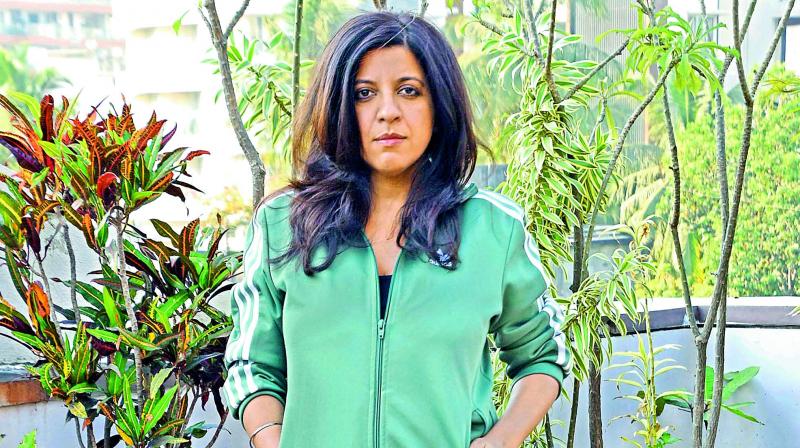Mad(E) in heaven

At last or finally, are words one rarely uses, but after too few hits and way too many misses, one finally has a homemade 'Prime' series to binge-watch. "Made in Heaven" has pathos and plausibility without being preachy and those are just the words starting with the letter 'p'. If I wore a hat, I'd doff it respectfully to the creative duo of Zoya Akhtar and Reema Kagti who have killed it with an enjoyable, exciting, extravaganza and that's just the letter 'e'. It helps that Sobhita Dulipalla and Arjun Mathur, who play the leads, are very good but hang on, the rest of the cast, the itty-bitty-sh*tty roles are superbly cast and beautifully played.
As the alert reader has figured out by now, the series depicts the drama that takes place onstage and behind the scenes between wedding planner and client and the manner in which they lie, scam and jugaad their way through life. Most of us do precisely the same, but then we don't always get our comeuppance and as we know, the guilty often go scot-free. Ask Mehul Choksi who is sipping from a fruity drink with a little frilly umbrella on a beach somewhere in Antigua.
'Made in Heaven' gives you the full-on vulgarity of the Delhi wedding scene, but peek beneath the designer labels and the lingerie is tatty and soiled. There are parents looking for pure brides for their sons, beauty pageants with a green card as the prize, matches built on fakery and shaadis being fixed in exchange for a flat in Sainik Farms. Yaar, what did you score at the end of the day; forget about love-shove, justice, respect and all that. Just show me the money. My favourite scene was where the videographer asks the NRI guy if he would be okay taking part in a contest. "Dude, I'm not forcing anyone, ok, I'm offering these women a way out of this sh*t hole. Why don't you just do your job, okay? Just take the video."
The nine episodes feature the planners facing off against a new couple and their parents. Back story: the protagonists, Tara and Karan have to deal with their own sh*t: she's in a failing marriage and he's a closeted gay, which forms the foundation on which the rest of the drama unfolds.
Tara, who comes from a lower middle-class background, gets a total makeover when she marries 'up' into the seriously rich Khanna family. She goes through the knife, fork and napkin routine in a finishing school to exchange her aloo-paratha background for a world of martinis and sushi but the cookie crumbles when she starts to suspect her husband of cheating on her with, wait for it, her best friend. If you were dying to offer unsolicited advice, hold your tongue. Her besties tell her to grin and bear it, "Be practical, yaar, sh*t happens." Ironically, she finds herself dispensing the same conventional wisdom to an agitated bride in the very first episode. "Deal with the impotence, because the in-laws will die soon and love sooner but the fortune you will inherit is forever." Really, ask Uncle Mehul, the Mai Tai now comes with a straw, no umbrella.
Karan, on the other hand, is a closet gay who is heavily in debt, living from one unattached hook-up to the next EMI. Vikrant Massey, Neena Gupta and Vijay Raaz play small cameos that glow with the radiance of the Kohinoor: thank god they don't blush unseen or waste their radiance on the desert air. The reason for this is simple: the filmmakers were totally emotionally invested in this project. Even the minor role actors went through a painstaking, meticulous series of re-takes until they got it right. That's the secret of its success right there: mainstream Bollywood sucks because everyone from Amitabh to Khan Market (pun intended) has directors and producers fawning on them while lesser mortals only stand and wait. Here every little role is crafted and polished until it gleams cinematically.
The plot line calls for the mehendi artist molested by the Maharaj to settle for 5 lacs hush money rather than go through a tortuous legal process with her powerful adversary. Viewed one way, it implies picking one's battles, viewed from the prism of respectability, is 5 lacs worth it for one's honour? It's a question that hits Tara deep in the gut when she discusses it with her husband and he glibly suggests, "Seriously, 5 lacs is a lot for a mehendiwalli, jaan." Tara ruefully remembers her courtship days, when her father-in-law who was her boss at the time, offers her precisely the same sum in hush money to move on and forget his son. Watch it if only because it's true to life in its portrayal of how ordinary people do extraordinarily brave things.
Ajit Saldanha has a finger in the pie, and another on the political pulse. And when he writes, he cooks up a storm.

